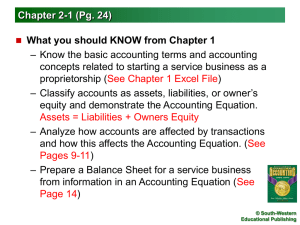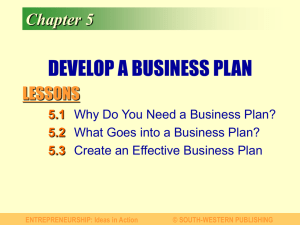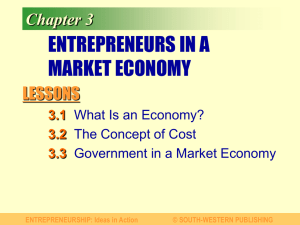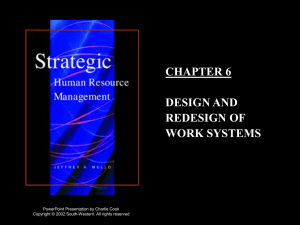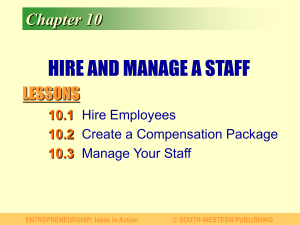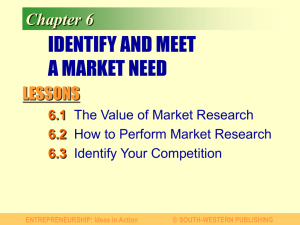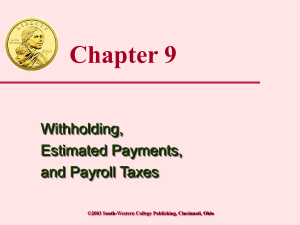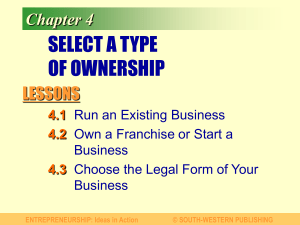Business Law Chapter 5 PPT
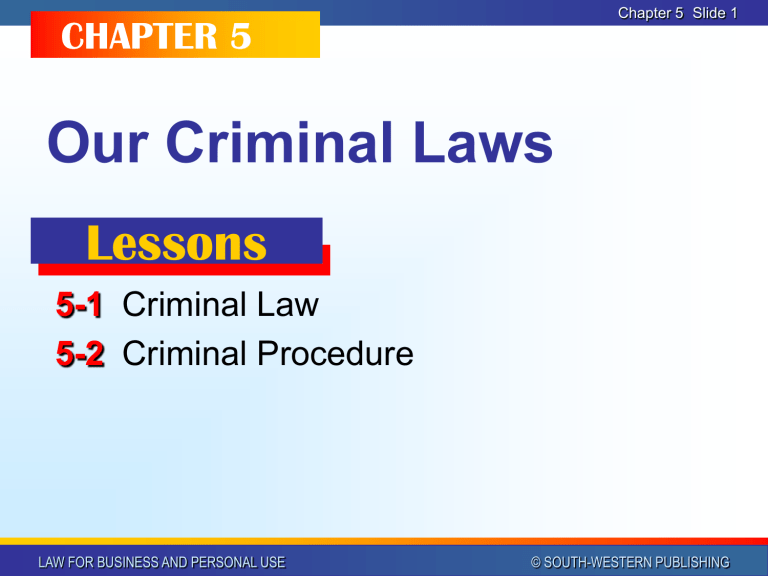
CHAPTER 5
Our Criminal Laws
Lessons
5-1 Criminal Law
5-2 Criminal Procedure
Chapter 5 Slide 1
LAW FOR BUSINESS AND PERSONAL USE © SOUTH-WESTERN PUBLISHING
Chapter 5 Slide 2
LESSON 5-1
Criminal Law
GOALS
Define the elements present in all crimes
Describe crimes that commonly occur in the business environment
LAW FOR BUSINESS AND PERSONAL USE © SOUTH-WESTERN PUBLISHING
Chapter 5 Slide 3
WHAT ARE CRIMES?
CRIME - punishable offense against society
Elements of a crime
Criminal conduct
LAW FOR BUSINESS AND PERSONAL USE © SOUTH-WESTERN PUBLISHING
Chapter 5 Slide 4
ELEMENTS OF A CRIME
Duty - to do or not to do a certain thing
Violation of the duty – (criminal act)
Criminal intent –
(required in most cases)
Intended to commit the act
Intended to do evil
LAW FOR BUSINESS AND PERSONAL USE © SOUTH-WESTERN PUBLISHING
Chapter 5 Slide 5
Davis (chief accountant)
Juggled books and took $35,000 belonging to credit union
Auditors discovered – Davis paid back with interest
Has she committed a crime despite the repayment?
LAW FOR BUSINESS AND PERSONAL USE © SOUTH-WESTERN PUBLISHING
Chapter 5 Slide 6
Owed duty (defined by statute)
Act – took money
The criminal conduct of taking another’s property or money by a person to whom it has been entrusted
EMBEZZLEMENT
Intent – intended to do evil
LAW FOR BUSINESS AND PERSONAL USE © SOUTH-WESTERN PUBLISHING
Chapter 5 Slide 7
CRIMINAL CONDUCT
Criminal conduct may be classified as follows:
Crimes against a person
Crimes against property
Crimes against the government and administration of justice
Crimes against public peace and order
Crimes against realty
Crimes against consumers
Crimes against decency
LAW FOR BUSINESS AND PERSONAL USE © SOUTH-WESTERN PUBLISHING
Chapter 5 Slide 8
Criminal Intent w/Corporations
Can a corporation form criminal intent?
Yes
If corporation’s employees have criminal intent – employer may be judged to have criminal intent
If employees are carrying out assigned duties and the criminal act benefits the organization
LAW FOR BUSINESS AND PERSONAL USE © SOUTH-WESTERN PUBLISHING
Chapter 5 Slide 9
Criminal Intent w/Corporations
When a corporate employee commits a crime, can officers be held responsible?
Yes - doctrine of VICARIOUS
CRIMINAL LIABILITY
Vicarious - substituted
LAW FOR BUSINESS AND PERSONAL USE © SOUTH-WESTERN PUBLISHING
Chapter 5 Slide 10
Criminal Intent w/Corporations
President of company is aware of dangerous working conditions and does nothing. Supervisor fails to take safety precautions and worker is killed.
President
possible homicide charges.
LAW FOR BUSINESS AND PERSONAL USE © SOUTH-WESTERN PUBLISHING
Chapter 5 Slide 11
Intent / Age
14 years + presumed to know right/wrong
7-14 has to be proven
6-19 age of criminal liability
Insane - incapable of intent
Not relieved for involuntary intoxication/drug use
LAW FOR BUSINESS AND PERSONAL USE © SOUTH-WESTERN PUBLISHING
EXAMPLES OF CRIMES
AGAINST A PERSON
Chapter 5 Slide 12
Assault and battery
Kidnapping
Murder
Rape
LAW FOR BUSINESS AND PERSONAL USE © SOUTH-WESTERN PUBLISHING
EXAMPLES OF CRIMES
AGAINST PROPERTY
Chapter 5 Slide 13
Embezzlement
Theft
Robbery
LAW FOR BUSINESS AND PERSONAL USE © SOUTH-WESTERN PUBLISHING
Chapter 5 Slide 14
EXAMPLES OF CRIMES
AGAINST THE GOVERNMENT
AND ADMINISTRATION OF JUSTICE
Perjury
Tax evasion
Treason
LAW FOR BUSINESS AND PERSONAL USE © SOUTH-WESTERN PUBLISHING
Chapter 5 Slide 15
EXAMPLES OF CRIMES AGAINST
PUBLIC PEACE AND ORDER
Disorderly conduct
Illegal speeding
Rioting
LAW FOR BUSINESS AND PERSONAL USE © SOUTH-WESTERN PUBLISHING
EXAMPLES OF CRIMES
AGAINST REALTY
Chapter 5 Slide 16
Arson
Burglary
Criminal trespass
LAW FOR BUSINESS AND PERSONAL USE © SOUTH-WESTERN PUBLISHING
EXAMPLES OF CRIMES
AGAINST CONSUMERS
Chapter 5 Slide 17
Fraudulent sale of securities
Violation of pure food and drug laws
LAW FOR BUSINESS AND PERSONAL USE © SOUTH-WESTERN PUBLISHING
EXAMPLES OF CRIMES
AGAINST DECENCY
Chapter 5 Slide 18
Bigamy
Obscenity
Prostitution
LAW FOR BUSINESS AND PERSONAL USE © SOUTH-WESTERN PUBLISHING
CLASSIFICATION
OF CRIMES
Felony
Misdemeanor
Chapter 5 Slide 19
LAW FOR BUSINESS AND PERSONAL USE © SOUTH-WESTERN PUBLISHING
Chapter 5 Slide 20
FELONY
A felony is a crime punishable by confinement for more than a year in a state prison or by a fine of more than
$1,000, or both —or even death.
LAW FOR BUSINESS AND PERSONAL USE © SOUTH-WESTERN PUBLISHING
Chapter 5 Slide 21
EXAMPLES OF FELONIES
Arson
Burglary
Embezzlement
Forgery
Kidnapping
Murder
Perjury
Rape
Robbery
Theft of large sums
LAW FOR BUSINESS AND PERSONAL USE © SOUTH-WESTERN PUBLISHING
Chapter 5 Slide 22
LAW FOR BUSINESS AND PERSONAL USE © SOUTH-WESTERN PUBLISHING
Chapter 5 Slide 23
LAW FOR BUSINESS AND PERSONAL USE © SOUTH-WESTERN PUBLISHING
Chapter 5 Slide 24
MISDEMEANOR
A misdemeanor is a less serious crime. It is usually punishable by confinement in a county or city jail for less than one year, by fine, or both.
Examples of misdemeanors include disorderly conduct and speeding
LAW FOR BUSINESS AND PERSONAL USE © SOUTH-WESTERN PUBLISHING
Chapter 5 Slide 25
INFRACTION
Some states classify lesser misdemeanors as infractions.
A person convicted of an infraction can only be fined.
Because there is no risk of being jailed, the defendant is not entitled to a jury trial.
Examples include littering and parking violations.
LAW FOR BUSINESS AND PERSONAL USE © SOUTH-WESTERN PUBLISHING
Chapter 5 Slide 26
BUSINESS-RELATED CRIMES
Larceny
Receiving stolen property
False pretenses
Forgery
Bribery
Computer crime
Extortion
Conspiracy
Arson
LAW FOR BUSINESS AND PERSONAL USE © SOUTH-WESTERN PUBLISHING
White-collar crimes
Offenses committed in the business world are referred to as white-collar crimes
Don’t involve force or violence
Do not cause injury to people
Do not cause physical damage to property
Chapter 5 Slide 27
LAW FOR BUSINESS AND PERSONAL USE © SOUTH-WESTERN PUBLISHING
Chapter 5 Slide 28
Antitrust Laws
State that competing companies may not cooperate in fixing prices or in dividing sales regions
Require that business business firms compete with one another
LAW FOR BUSINESS AND PERSONAL USE © SOUTH-WESTERN PUBLISHING
Chapter 5 Slide 29
Larceny (robbery)
The taking of property from another’s person or immediate presence, against the victim’s will, by force or by causing fear
LAW FOR BUSINESS AND PERSONAL USE © SOUTH-WESTERN PUBLISHING
Chapter 5 Slide 30
Larceny (burglary)
Entering a building without permission when intending to commit a crime
LAW FOR BUSINESS AND PERSONAL USE © SOUTH-WESTERN PUBLISHING
Chapter 5 Slide 31
False pretenses
When one who obtains money or other property by lying about a past or existing fact
Differs from larceny because the victim parts with the property voluntarily
A type of fraud
LAW FOR BUSINESS AND PERSONAL USE © SOUTH-WESTERN PUBLISHING
Chapter 5 Slide 32
Forgery
LAW FOR BUSINESS AND PERSONAL USE
Falsely making or materially altering to defraud another
Most commonly found on checks when one signs another’s name without permission to do so
© SOUTH-WESTERN PUBLISHING
Chapter 5 Slide 33
Bribery
Unlawfully offering or giving anything of value to influence performance of an official
Soliciting or accepting the bribe is also criminal
LAW FOR BUSINESS AND PERSONAL USE © SOUTH-WESTERN PUBLISHING
Chapter 5 Slide 34
Computer crime
Larceny when stealing computer data is harder to prosecute
Courts conclude that there is not a
“taking” of personal property if the data is copied and deleted
© SOUTH-WESTERN PUBLISHING LAW FOR BUSINESS AND PERSONAL USE
Chapter 5 Slide 35
Extortion
Commonly known as blackmail
Obtaining money or other property from a person by wrongful use of force, fear, or the power of office
The extortionist may threaten to inflict bodily damage
Exposing an embarrassing fact
LAW FOR BUSINESS AND PERSONAL USE © SOUTH-WESTERN PUBLISHING
Chapter 5 Slide 36
Conspiracy
An agreement between two or more persons to commit a crime
Usually agreement is secret
The conspiracy is a crime separate from the crime parties planned to commit
Crime could be a felony or a misdemeanor
LAW FOR BUSINESS AND PERSONAL USE © SOUTH-WESTERN PUBLISHING
Chapter 5 Slide 37
Arson
The willful and illegal burning of a building
Occurs when someone intentionally starts a fire and burns a structure without the owner’s consent
LAW FOR BUSINESS AND PERSONAL USE © SOUTH-WESTERN PUBLISHING
Chapter 5 Slide 38
LESSON 5-2
Criminal Procedure
GOALS
Know the rights a person has when arrested
Recognize a person’s potential criminal liability for the actions of others
Understand the justifiability of the common defenses to criminal charges
LAW FOR BUSINESS AND PERSONAL USE © SOUTH-WESTERN PUBLISHING
Chapter 5 Slide 39
Constitutional Rights
Authors of our Constitution believed it was better for society to give individuals too much liberty than to allow the government too much power.
Probable Cause - a reasonable ground for belief
LAW FOR BUSINESS AND PERSONAL USE © SOUTH-WESTERN PUBLISHING
Chapter 5 Slide 40
Agree / Not Agree
During a routine traffic stop of a small truck for speeding, an officer became suspicious of the cargo the truck contained due to a smell coming from inside. When his request to search the truck was refused, the officer radioed for the assistance of a drug dog. Unfortunately, the dog was unavailable.
LAW FOR BUSINESS AND PERSONAL USE © SOUTH-WESTERN PUBLISHING
Chapter 5 Slide 41
Agree / Not Agree
Finally, he ordered the driver to open the cargo area. When the driver did so, the officer found more than a ton of marijuana.
At trial, the defense attorney maintained that it was an illegal search and seizure and that the marijuana should not be allowed to be used as evidence.
LAW FOR BUSINESS AND PERSONAL USE © SOUTH-WESTERN PUBLISHING
Chapter 5 Slide 42
Agree / Not Agree
Search was deemed unreasonable as it lacked probable cause
marijuana could not be used as evidence
LAW FOR BUSINESS AND PERSONAL USE © SOUTH-WESTERN PUBLISHING
Chapter 5 Slide 43
Rights
Convict a person of a crime – evidence must establish guilt
“beyond a reasonable doubt”
Right to a trial by jury
-- prosecutor or defendant can request
Guilty Verdict
-- only if all jurors vote to convict
LAW FOR BUSINESS AND PERSONAL USE © SOUTH-WESTERN PUBLISHING
Chapter 5 Slide 44
RIGHTS AND
RESPONSIBILITIES
Rights when arrested
Due process (probable cause)
Representation by a lawyer (private /courtappointed)
Responsibility for the criminal conduct of others
Accomplice – knowingly aids in the commission of crime (also guilty of criminal wrongdoing)
LAW FOR BUSINESS AND PERSONAL USE © SOUTH-WESTERN PUBLISHING
Chapter 5 Slide 45
DEFENSES TO
CRIMINAL CHARGES
DEFENSE – a legal position taken by an accused to defeat the charges against him/her
Procedural defenses – based on problems with the way evidence is obtained or the way an accused person is arrested, questioned, tried or punished
confessing to a crime because of police threats
LAW FOR BUSINESS AND PERSONAL USE © SOUTH-WESTERN PUBLISHING
Chapter 5 Slide 46
DEFENSES TO
CRIMINAL CHARGES
Substantive defenses – disprove, justify, or excuse the alleged crime
Alibi
Self defense – only non-deadly force if reasonable sufficient
Criminal insanity – know right from wrong
Immunity – freedom from prosecution even when one has committed the crime
LAW FOR BUSINESS AND PERSONAL USE © SOUTH-WESTERN PUBLISHING
Chapter 5 Slide 47
Contempt of Court – action that hinders the administration of justice
crime punishable by imprisonment
LAW FOR BUSINESS AND PERSONAL USE © SOUTH-WESTERN PUBLISHING
Chapter 5 Slide 48
PUNISHMENTS
FOR CRIMES
A penalty provided by law and imposed by a court is called a punishment .
The purpose is not to remedy the wrong but rather to discipline the wrongdoer.
LAW FOR BUSINESS AND PERSONAL USE © SOUTH-WESTERN PUBLISHING
Chapter 5 Slide 49
PLEA BARGAINING
Plea bargaining is when an accused person agrees to plead guilty to a less serious crime in exchange for having a more serious charge dropped.
When plea bargaining the accused gives up the right to a public trial to avoid the risk of greater penalty if convicted.
LAW FOR BUSINESS AND PERSONAL USE © SOUTH-WESTERN PUBLISHING
The Ripple Effect
Chapter 5 Slide 50
LAW FOR BUSINESS AND PERSONAL USE © SOUTH-WESTERN PUBLISHING
